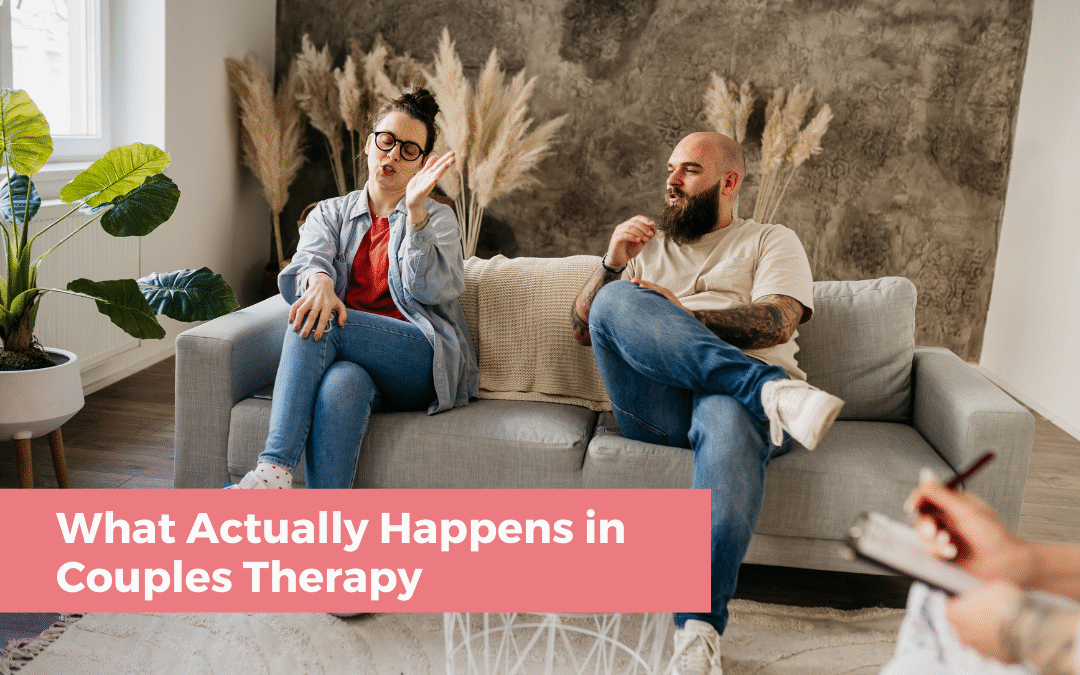If you’ve never been to couples therapy before, it can feel a little intimidating. What if it’s awkward? What if it makes things worse? The reality is, that therapy is structured to create a safe space for both partners to be heard and to work toward solutions together.
Couples therapy is not about taking sides. It’s not about one partner being “right” and the other being “wrong.” Instead, it’s about fostering better communication, understanding the patterns in your relationship, and learning practical tools to navigate conflict more effectively. A therapist helps you uncover underlying issues that may be contributing to tension and equips you with strategies to work through challenges constructively.
What to expect in your first couples therapy session?
The first session is about setting the stage for productive conversations. Your therapist will ask about your relationship history, your concerns, and your goals for therapy. You and your partner will each have a chance to share your perspectives, and your therapist will guide the conversation to help uncover the root issues.
Many couples worry that therapy will force them to air all their problems immediately, but that’s not how it works. The process is gradual, ensuring that both partners feel comfortable and supported. Some common areas covered in therapy include:
- Improving communication – Learning how to express thoughts and emotions in a way that fosters understanding rather than conflict
- Navigating conflict – Understanding why certain disagreements keep happening and developing healthier ways to resolve them
- Strengthening intimacy – Exploring emotional and physical connection, and identifying what may be getting in the way
- Managing external stressors – Addressing how life changes, work, family dynamics, or other factors impact the relationship
Common therapy topics
Couples therapy is tailored to each relationship, but there are common themes that often come up. Communication breakdown is one of the most frequent issues, as couples struggle to feel heard and understood. Intimacy, both emotional and physical, can also be a challenge, whether that means reconnecting after years of routine or addressing deeper concerns about affection and desire. Conflict resolution is another key area, helping couples navigate disagreements without them escalating into ongoing resentment. Therapy also explores how past experiences, family dynamics, and personal values shape the way each partner interacts in the relationship.
Check out this podcast episode – Is couples therapy right for your relationship?
Gottman therapy and why structure matters
At The Therapy Hub, one of the approaches we use is Gottman Therapy, one of the most well-researched and structured approaches to couples therapy. Developed by Drs. John and Julie Gottman, this method is based on decades of studying relationships and identifying what makes them succeed or break down.
One of the key frameworks used in Gottman Therapy is the concept of the Four Horsemen, stonewalling, contempt, criticism, and defensiveness which are negative communication patterns that can predict relationship struggles. By identifying and replacing these patterns with healthier alternatives, couples can build stronger and more resilient connections.
Gottman Therapy also includes a structured assessment process, where couples complete questionnaires to provide insight into their relationship strengths and challenges. This allows the therapist to tailor sessions to the specific needs of the couple rather than taking a one-size-fits-all approach.
The difference between weekly therapy and intensive sessions
Couples therapy can take different formats depending on a couple’s needs. Traditional weekly or fortnightly sessions allow for gradual progress, giving couples time to practice new skills between sessions and work through issues at a steady pace. This format is great for couples who want ongoing support and guidance as they build better relationship habits.
For couples who need to address issues more urgently or who have demanding schedules, intensive therapy (also called Marathon Couples Therapy) may be a better fit. In intensive therapy, couples engage in extended sessions over two or three full days. This approach allows for deeper, more concentrated work, helping couples make significant progress in a shorter timeframe. It can be particularly beneficial for couples dealing with long-standing issues or those in high-conflict situations who want to break negative patterns quickly.
The value of couples therapy whether you stay together or not
Regardless of the outcome, therapy offers a safe space to explore options with professional guidance, helping both partners make informed and thoughtful decisions rather than acting from a place of fear or frustration. Even if a couple decides to separate, therapy can help them part ways with respect and understanding, especially when children or shared commitments are involved.
Therapy is not just about “fixing” relationships. It’s about fostering awareness, making conscious choices, and creating healthier dynamics, whether that means strengthening a relationship or finding a way to move forward separately with mutual respect.









Recent Comments